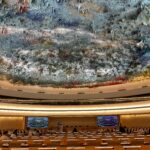A decade after the unanimous endorsement of the UN Guiding Principles on Business and Human Rights and the elaboration of the OECD Guidelines for Multinational Enterprises, there is no debate that investors have the responsibility to respect human rights and the influence investors can play in advancing (or not) issues related to social and environmental impacts. Ksapa held a partner session during the 2024 OECD Forum on Responsible Mineral Supply Chains. Summary of talks held on forced labor and investors.
Most Financial Actors Fail to Connect Human Rights With Investment Criteria
As highlighted by the recent report by the UN Working Group on Business and Human Rights on “Investors, ESG and human rights”, “a key challenge is that most financial actors fail to connect human rights standards and processes with ESG criteria and investment practices because of a prevailing lack of understanding in the sector that social criteria, and many environmental and governance indicators, reflect human rights issues.”
As underpinned in the Paris Agreement, the transition to a green, low-carbon economy must be both fast and fair. As investors address climate change challenges in their strategies, it is imperative that they also incorporate the social dimension and impacts on people.
In 2023, Ksapa launched The Green Transition Free from Forced Labor (GT3FL) Initiative, which was formed in response to industry demand for guidance in navigating current and upcoming international regulations and assisting in improving business practices around human rights and forced labor issues in global supply chains.
The Initiative brought together a group of founding members from both European & American companies, looking to find concrete solutions to forced labor and additional human rights risks in their efforts towards a green and just transition. The Initiative united a multi-industry group from both the private sector and contributing international organizations and experts coming together in partnership under a common cause to collaborate on finding solutions on the topic of human rights and forced labor in supply chains globally, focusing on the Green Transition and with special concentration on the renewable energy sector, with an initial focus on solar panels and batteries.
As part of its mandate, the members co-created a toolkit that is intended to guide both investors and buyers, to reflect on the systemic issues related to forced labor in the green transition and look at possible solutions by reflecting on the operational challenges and the expectations of stakeholders.
Brief Summary of the Partner Session held by Ksapa during the 2024 OECD Forum on Responsible Minerals Supply Chains
In the latest 2024 OECD Forum on Responsible Mineral Supply Chains, Ksapa hosted a partner webinar that explored the role of investors in addressing forced labor in the green transition with key stakeholders. We invite you to listen to the conversation in full as it was a very insightful conversation (if we do say so ourselves!) but here are some of the top takeaways of what investors should do going forward:
- There is growing pressure on financial institutions to clarify and proactively play a role ensuring to support green transition with clear safeguards mitigating risks. Investors should establish adequate strategies to tackle forced labor issues.
- Investors should themselves conduct human rights impact assessments to identify and assess the actual and potential human rights impacts of investees prior to investing and on an ongoing basis once invested and track the effectiveness of human rights due diligence efforts.
- The green transition value chains are complex, it is essential through human rights due diligence to map and prioritize tackling the issues by assessing risks through country and sector.
- When considering the green transition, investors should think about the transition “out,” leaving workers of high carbon sites at risk of forced labor and transitioning “into” green transition.
- It is too easy to focus solely on investors. The role of other actors including policymakers, alignment of practices in the community, multilateral/ bilateral institutions must be articulated and made more consistent.
- Various good practices available. Including our toolkit, panelists also shared various concrete tools helping on due diligence, traceability, actual corrective action on the ground.
In short, yes there are still complex issues that need tackling, but what is crystal clear is that climate, the environment and social impacts are interconnected, and their advancement depends on the integration of a human-rights based approach in existing ESG strategies seeking to achieve the green transition.
Operating with experts and networks able to engage on these sensitive issues virtually worldwide, we stand at the ready to provide tailored solutions at Ksapa. Contact us!

Krystel Bassil
Krystel is senior consultant, contributing to Ksapa’s consulting and advocacy missions, on the topic of business and human rights and more generally sustainability. Krystel Bassil is also Senior Legal Officer of the Human Rights and Business Unit at the Syrian Legal Development Programme (SLDP). Prior to that Krystel worked as a business and human rights consultant advising along with leading experts on a wide range of projects across the private sector, international organizations, and academic institutions. She is admitted to the Beirut Bar and worked as a lawyer in international arbitration and human rights. Krystel holds a LL.M. degree from SOAS, School of Oriental and African Studies, University of London, a law degree in public law from the Holy Spirit University of Kaslik, Lebanon, and a degree in political science from the Saint-Joseph University of Beirut. She is fluent in French, English and Arabic.









